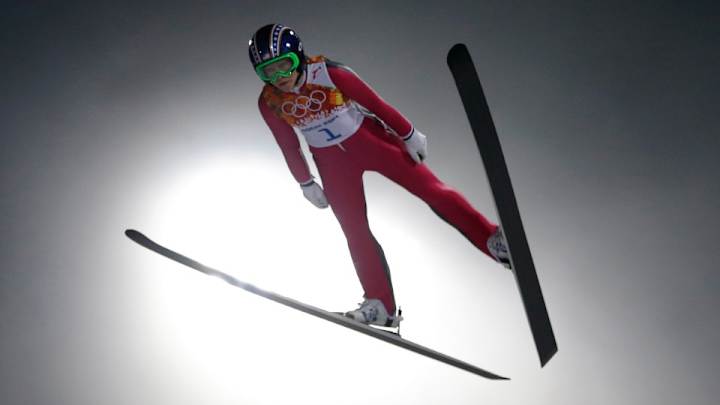History made, pulses raised in first-ever Olympic women's ski jump

SOCHI — It was a wild and momentous occasion, yes, for the 30 women who jumped into history Monday night at the RusSki Gorki Jumping Center. But it was also an important moment for sport.
Coming off of a brutal injury and with no World Cup events this season, American Sarah Hendrickson was the first woman down the hill. When she lets go of the metal beam at the top, she usually thinks about something technical—her posture or the proper angles at take-off—but Monday night, her thoughts were blank. “My coach asked me what I was thinking,” she said after placing 21st overall. “I was like, ‘I don’t know. Ice cream?’”
She tried to treat it as any competition, but of course, this was not. It was the Olympics. Her teammate Lindsay Van, a barrier breaker and pioneer who helped the sport climb into the Olympic program, finished well out of medal contention, in 15th place. And yet Van beamed. “I’ll take it,” she said. “It was by best ever Olympic performance.”
Maybe it would’ve been fitting if that first jump belonged to Van, fellow U.S. jumper Jessica Jerome, Austria’s Daniela Iraschko-Stolz or one of the other six women that joined a lawsuit to fight for women’s inclusion and soared head-on into the winds of tradition, of discrimination. But no, it was Hendrickson who made the leap, and 22-year-old Carina Vogt of Germany who won gold, a new generation that can prove the sport’s legitimacy through their actions on the snow.
The historic note wasn’t lost on anybody who jumped or who watched. At the venue, the event entertainers continually spoke to women in the crowd. The speakers blared with Katy Perry’s “California Gurls,” Metro Station’s “Japanese Girl” (for favorite Sara Takanashi, who finished fourth), and “Girls Just Want to Have Fun.” There was an obvious theme to the night.
“I’m here among 30 girls making history,” Norway’s Line Jahr said. “I think I will be very proud of this when I get older. … For me, it didn’t matter who won. I’m happy for all the medalists.”
Indeed, the celebrations, for the most part, were communal. When Vogt saw her winning score flash on the screen, she all but collapsed and then was engulfed by her German teammates in celebration. “There’s a camaraderie here,” said Jerome, who flew 97 and 99 meters on her two jumps, “because we’ve all been fighting the same fight.”
They fought for this right against people and institutions that deemed it unsuitable for women—whether for safety or for preserving the sport’s masculinity. But watching ski jumping for the first time in person, it is indeed terrifying. On television, it looks graceful and controlled. Camera angles and slow motion do not capture the scale and magnitude of just how far they fall. It makes one wonder about the sanity of those who take on the sport, and yes, standing at the bottom of the hill, I couldn’t help but think: Women shouldn’t do this. Men shouldn’t do this. My neighbor’s sick cat shouldn’t do this. It is dangerous and crazy.
What in the world would compel a person to launch themselves off a steep hill at 55 mph with nothing but skis on their feet and a bulbous helmet on their head? “It’s an adrendaline rush,” Canadian Taylor Henrich said. “I mean, who doesn’t want to jump off a hill?”
Who? Lots of people don’t. But then there’s this.
“It’s the flying,” Jahr said. “When you leave the take-off and you feel you have a lot of speed in your body. Your skis start to push [up] and you just go higher and higher. You start to fly forward. Then you feel, this is going to be a far jump. It is an incredible feeling.”
She was smiling wide and excited to explain. And then you think: Who am I to tell someone who’s worked so hard, that’s mastered a terrifying skill, that they shouldn’t do something that brings them such unbridled joy on the sport’s biggest stage?
And that is exactly the point.

Writer-Reporter, Sports Illustrated Sarah Kwak joinedSports Illustrated as an editorial intern in 2006 before being hired full-time as a reporter in June 2007. A graduate of Duke University, she covered the school's storied athletics program, including three Duke-UNC meetings in Cameron Indoor Stadium and a trip to the Sweet 16. Since then, she has shifted focus from the hard-court to the ice rink, primarily covering the NHL, but she has also covered golf and two Olympics (Vancouver—2010 and London–2012) for SI and SI.com. She lives in New York, well within walking distance to at least four Chipotle locations.